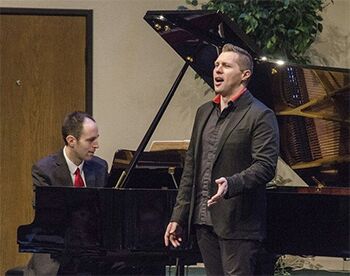by Nicholas Stevens

The concert on Monday, March 9 lit up West Shore Unitarian Universalist Church in Rocky River from within, its performers radiant. Baritone Mario Diaz-Moresco and pianist Spencer Myer, both lauded in the concert world and still rising, explored the four Bs — Beethoven, Barber, Bolcom, and Bernstein — as well as “deep-cut” Debussy for the Rocky River Chamber Music Society. The featured vocalist remains young, still yet to gain the grit and grain of deep experience, and the program featured some obscure works by famous composers. These factors did nothing to squelch the joys on offer, and readers should run, not walk to hear these performers as soon as live concerts resume.
Beethoven’s An die Ferne Geliebte made for an unexpectedly perfect opener. With its springtime yearnings, the song cycle invites a crisp, fresh sound. Diaz-Moresco delivered, tastefully leaning into key words. Here as ever, Myer maintained an ideal balance, embracing the baritone’s sound. The duo’s performance of the second song — more halting than its lilt might suggest — oozed an angst that bled over into the next. Myer’s transitions helped keep the interconnected songs moving, making the duo’s concluding acceleration and crescendo in the last song feel like the recapitulation of a movement, rather than the final track on an album.
Alone onstage for Beethoven’s Andante favori in F, Myer stuck to impassive dignity for the first section of the piece, thereby making a sudden key change feel all the more disruptive. He managed to make later statements of the opening theme feel experienced, perhaps weathered, in a show of high artistry. The piece ends more than resolves, allowing Myer to proceed logically to the composer’s Rondo in C, Op. 51. Even in this tiny piece, Beethoven chafes at the limits of form and technique. Recognizing this, Myer emphasized its flights of virtuosity and digression.
Diaz-Moresco brought flair and, occasionally, wonderful cragginess to Debussy’s Trois ballades de François Villon, with special urgency reserved for the prayer of the second song. Exquisitely akimbo for the “Ballad of the Women of Paris,” he made a valiant, expressive case for a composition that, in less capable hands, would be hard to love.
The baritone likewise made the most of the expressive, silly, and operatic extremes of Barber’s Three Songs, a sheaf of micro-miniatures. Myer did not need to show off his ability to keep the final chord shimmering, casually opening a portal to the sublime, but I thank him for it. Listeners who know Barber for his iconic Adagio for Strings would have been surprised to hear Myer launch into the composer’s Excursions for solo piano, a rarity that smacks of Gershwin. Highlights included the first movement, in which the pianist allowed a pounding gesture to drift out of time as other material rose below, and the fourth, in which his hands either hovered on top of one another or crossed throughout.
Bolcom’s Cabaret Songs infuse vaudevillian tunes with classical finesse, and Myer leaned into the second half of that formula in the first two of the duo’s selected songs. The decadence of “Oh Close the Curtain” found the pair at peak camp, Diaz-Moresco inhabiting the character of an anguished partygoer so fully that the song’s climactic burst of saltiness felt both genuine and refreshing. It was, however, in “George” that the duo cut loose, the singer treating the piano as the title character’s open casket. An encore found Diaz-Moresco as fresh and energized as ever. The sadly prophetic selection: Bernstein’s Lonely Town.
Published on ClevelandClassical.com March 23, 2020.
Click here for a printable copy of this article



